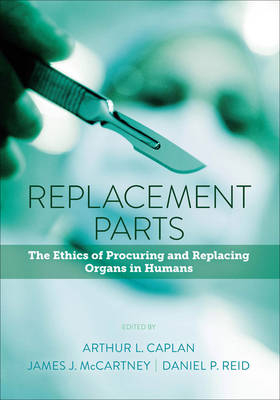
Replacement Parts
Georgetown University Press (Verlag)
978-1-62616-235-8 (ISBN)
In Replacement Parts, internationally recognized bioethicist Arthur L. Caplan and coeditors James J. McCartney and Daniel P. Reid assemble seminal writings from medicine, philosophy, economics, and religion that address the ethical challenges raised by organ transplantation. Caplan's new lead essay explains the shortfalls of present policies. From there, book sections take an interdisciplinary approach to fundamental issues like the determination of death and the dead donor rule; the divisive case of using anencephalic infants as organ donors; the sale of cadaveric or live organs; possible strategies for increasing the number of available organs, including market solutions and the idea of presumed consent; and questions surrounding transplant tourism and "gaming the system" by using the media to gain access to organs. Timely and balanced, Replacement Parts is a first-of-its-kind collection aimed at surgeons, physicians, nurses, and other professionals involved in this essential lifesaving activity that is often fraught with ethical controversy.
Arthur L. Caplan is head of the Division of Bioethics at New York University Langone Medical Center and the author or editor of over thirty books and six hundred articles. James J. McCartney is an associate professor in the Philosophy Department at Villanova University and an adjunct professor in its School of Law. In the past he has been the ethics consultant for several major health systems in the United States. Daniel P. Reid is a recent graduate of Villanova University.
IntroductionArthur L. Caplan Part One: The Dead Donor Rule, the Determination of Death, and Organ Transplantation from (Almost?) CadaversJames J. McCartney1. The Dead Donor Rule and the Concept of Death: Severing the Ties That Bind ThemElysa R. Koppelman2. The Theoretical and Practical Importance of the Dead Donor RuleJames J. McCartney3. The Dead-Donor Rule and the Future of Organ DonationRobert D. Truog, Frank G. Miller, Scott D. Halpern 4. The Dead Donor Rule: Effect on the Virtuous Practice of Medicine Frank C. Chaten 5. BRAIN DEATH without DefinitionsWinston Chiong 6. Accepting Brain Death David C. Magnus, Benjamin S. Wilfond, Arthur L. Caplan 7. Address to the International Congress on TransplantsKarol Wojtyla (Pope John Paul II) 8. Brain Death: Can It Be Resuscitated?D. Alan Shewmon 9. The Boundaries of Organ Donation after Circulatory DeathJames L. Bernat 10. Should We Allow Organ Donation Euthanasia? Alternatives for Maximizing the Number and Quality of Organs for TransplantationDominic Wilkinson and Julian Savulescu 11. The Ethics of Non-Heart-Beating Donation: How New Technology Can Change the Ethical LandscapeKristin Zeiler, Elisabeth Furberg, Gunnar Tufveson, Staffen Welin Part Two: The Use of Anencephalic Infants as Organ DonorsJames J. McCartney 12. Anencephalic Donors: Separate the Dead from the DyingAlexander Morgan Capron 13. Anencephalics as Organ DonorsRichard M. Zaner 14. Ethical Issues in the Use of Anencephalic Infants as a Source of Organs and Tissues for TransplantationArthur L. Caplan 15. Use of Anencephalic Newborns as Organ Donors: Position StatementCanadian Paediatric Society Part Three: Sale of Cadaveric or Live OrgansDaniel P. Reid16. Iranian Model of Paid and Regulated Living-Unrelated Kidney DonationAhad J. Ghods, and Shekoufeh Savaj 17. Regulated Payments for Living Kidney Donation: An Empirical Assessment of the Ethical ConcernsScott D. Halpern, Amelia Raz, Rachel Kohn, Michael Rey, David A. Asch, and Peter Reese 18. The Hidden Cost of Organ SaleSheila M. Rothman and David J. Rothman 19. Commercial Organ Transplantation in the PhilippinesLeigh Turner 20. Kidney Vending: The "Trojan Horse" of Organ TransplantationGabriel M. Danovitch, and Alan B. Leichtman 21. Financial Incentives for Cadaveric Organ DonationDavid Mayrhofer-Reinhartshuber and Robert Fitzgerald Part Four: Other Strategies for Increasing the Number of Available OrgansDanieil P. Reid22. Nudge, Nudge or Shove, Shove-The Right Way for Nudges to Increase the Supply of Donated Cadaver OrgansKyle Powys Whyte , Evan Selinger , Arthur L. Caplan, Jathan Sadowski 23. The Case for "Presumed Consent" in Organ DonationIan Kennedy, Robert A. Sells, Abdallah S. Daar, Ronald D. Guttmann, Raymond Hoffenberg, Michael Lock, Janet Radcliffe-Richards, and Nicholas Tilney24. A Critical Approach to the Current Understanding of Islamic Scholars on Using Cadaver Organs Without Prior PermissionSahin Aksoy 25. Priority in Organ Allocation to Previously Registered Donors: Public Perceptions of the Fairness and Effectiveness of Priority SystemsJennifer A. Chandler, Jacquelyn A. Burkell, and Sam D. Shemie 26. The Use of Prisoners as Sources of Organs-An Ethically Dubious PracticeArthur L. Caplan 27. Presumed Consent to Organ Donation in Three European Countries Barbara L Neades 28. Kidney Paired Donation 2011David Serur and Marion Charlton 29. Kidney Paired Donation C. Bradley Wallis, Kannan P. Samy, Alvin E. Roth, and Michael A. Rees 30. Some High Risk Kidneys Safe for TransplantKristina Fiore Part Five: Gaming the System Arthur L. Caplan31. The Declaration of Istanbul on Organ Trafficking and Transplant Tourism Participants in the International Summit on Transplant Tourism and Organ Trafficking Convened by the Transplantation Society and International Society of Nephrology in Istanbul, Turkey, April 30-May 2, 2008 32. The Hazards of Transplant TourismFrancis L. Delmonico 33. Transplant Tourism in China: A Tale of Two TransplantsRosamond Rhodes & Thomas Schiano 34. Multiple Listing in Kidney Transplantation Mohammad Sanaei Ardekani and Janis M. Orlowski5. Can Any System of Rationing Withstand the Plea of a Ten-Year-Old Girl? Arthur L. Caplan and Jennifer deSante ContributorsPermissions and CreditsIndex
| Co-Autor | Arthur L. Caplan, James J. McCartney |
|---|---|
| Zusatzinfo | 4 Figures; 2 Tables, unspecified |
| Verlagsort | Washington, DC |
| Sprache | englisch |
| Maße | 178 x 254 mm |
| Gewicht | 454 g |
| Themenwelt | Medizin / Pharmazie ► Medizinische Fachgebiete ► Medizinethik |
| Studium ► Querschnittsbereiche ► Geschichte / Ethik der Medizin | |
| ISBN-10 | 1-62616-235-2 / 1626162352 |
| ISBN-13 | 978-1-62616-235-8 / 9781626162358 |
| Zustand | Neuware |
| Haben Sie eine Frage zum Produkt? |
aus dem Bereich


